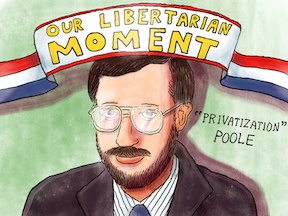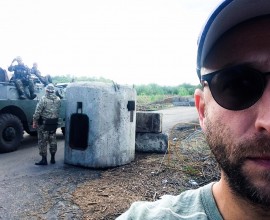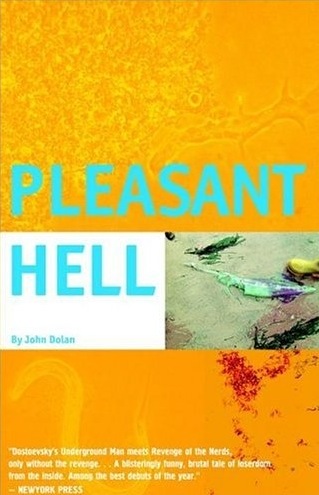
WARRINGTON, PA — The last thing you want to hear from a 21-year-old from Mariupol is that, really, there’s not much of a difference between Ukraine and the States.
Mariupol is one of those featureless Ukrainian rustbelt cities that came of age under the Soviets; its only distinction is that its port is reputedly one of the main conduits through which Central Asian smack makes its way to Western Europe. That Mariupol has the highest per capita number of junkies in Ukraine lends credibility to that rumor.
But worldly Max, having tasted life in cosmopolitan capitals Mariupol and Warrington, Pennsylvania, decided that the two countries were quite alike. My initial, kneejerk reaction was, of course, that Max is totally insane. How could he — a kid with a pinched face who didn’t speak English and whose American experience was limited to a month working at a suburban Burger King — delude himself like that? What was this ignorant punk thinking?
 “Minimum wage is cool! Nishtyak, blya!”
“Minimum wage is cool! Nishtyak, blya!” But after spending a couple of days with Max and a crew of temporary workers in America on J-1 visas, observing their imprisoned life in this far-flung Philly suburb, I concluded that Max’s understanding of America was much deeper than I originally gave him credit for.
Everyone’s got strategies for avoiding the most hateful aspects of American life. Since I moved back six months ago I’ve walled myself off from white America, living in a Dominican ghetto and chilling with a group of Nigerian hustlers. Compared to me, Max was a regular Margaret Mead; he’d gone native, studying Americans in their natural habitat. And what he saw from his vantage point washing dishes in the back of Burger King was the true face of modern America — provincial, obese, and entirely joyless.
“I came here because I wanted to make a lot of money,” he said. “Don’t get me wrong, I still want it. But now I just think it makes you fat.”
The nearly 20 kids from the CIS that were working in three Warrington area BKs would have made a great cast of characters for the next round of Poslednii Geroi, Channel 1’s Survivor imitation. It was obvious that none of them would ever have hung out together back home, but being without a car in suburban hell is like being stranded on a desert island. Even the few who spoke English with relative ease spent most of their time hanging out with the other CISers. But for the girls’ frequent telephone calls home, they almost exclusively lived in a hermetically sealed Russian-language enclave penetrated only by the American BK workers.
There were two Maxes, the Mariupol cynic and an Asiatic Max from Altai who spent his entire first paycheck, over $300, on an X-Box, TV and the latest Mortal Kombat game. Altai Max had clearly figured out how to make living in the States bearable before the others did. Then there was Vadim, a tall, dorky guy from Minsk with a spindly goatee and the look of a borderline Tolkienist or gamer. Dasha was a cute, bookish girl from Uman who is now studying at the Baptist-financed International Christian Academy in Kiev. There was Viktoria, a total babe from some eastern Ukrainian town who dressed in a sort of cowgirlish style and was screwing a half black guy who worked as a bouncer at a dive the next town over. Yulia didn’t know any English despite the fact that she was enrolled at the English department at Vladikavkaz’s university. Lili was from western Ukraine and didn’t even try to subdue her strong Ukrainian accent. And, of course, Seryozha, the cool kid from Moscow. All they really needed was a representative from Siberia and some hidden cameras, and it could have been a hit series. As it was, without the cameras to prod them into making fools of themselves, it was a pretty boring group.
The modern incarnation of the J-1 visa was created in response to a funny thing that happened about ten years ago, right around the time me and all my contemporaries were supposed to grab the keys to dad’s station wagon, drive to the nearest strip mall and pick up an application at Mickey D’s to land our first jobs. Working a fast food gig seemed, for a while, as essential to the suburban high school identity as the prom, 50 required hours of community service and Turkey Day games against a football team fielded by the neighboring ‘burb. Everybody from jocks to the trenchcoat mafia kids was expected to serve time flipping burgers in order to have disposable income to spend on Oxy wipes and 24 packs of Natty Lite. It was part of what made America great, initiating kids into a life of unfulfilling jobs while ensuring that hordes of office workers would be supplied with cheap, grease soaked calories available at convenient drive-thru windows on the commute home.
But by the time my generation was in Driver’s Ed, minimum wage had long ago stopped keeping pace with inflation. Most of us weren’t willing to work for $4.25 an hour doing anything, let alone that brutal combination of assembly line work, customer service, Big Brother surveillance and unfortunate odors that is working in Fast Food.
Various tactics were tried to keep the machine greased with worker bees — Clinton raised minimum wage slightly, welfare moms were forced to punch clocks in order to get their benefits, multinationals created propaganda to convince employees that they held a stake in the Team — but nothing could keep the lower end of the service industry from hemorrhaging labor. The problem was especially acute in bedroom communities, far from the vast labor pool of black and brown lumpenproletariat of the inner cities.
And then some clever bureaucrat thought up the J-1 visa. Advertised as a “work-travel” visa that gives foreign students a chance to visit the States, the J-1 functions as a way to import cheap temporary labor without offering any social benefits (J-1ers don’t even have to pay taxes) to places with acute labor shortages, where the workers perform what must be, after fruit picking, the shittiest jobs in the US. Low-wage manufacturing jobs fled the country long ago, but the low-fee service sector had to stay put, for obvious reasons. The J-1 allows places ranging from Burger King to summer camps to tap into the global pool of labor rather than the old-fashioned way of luring workers to miserable jobs, by paying higher wages. It is particularly heinous because the workers have to pay their own way for the privilege of working where no-one else wants to. While it’s sold by places like STAR and Council Travel as an opportunity to see the States, learn English and return home with wads of cash, really it ends up being much closer to indentured servitude.
Not all J-1 workers are equal, of course. Everyone from the Irish to Eastern Europeans and Nicaraguans flock here to work for the summer, with the English speakers and veterans generally getting the prime jobs involving free housing, such as working as a nanny or country club bartender. Lots of J-1ers even come back. Nothing prevents motivated J-1ers from hunting for work on their own, so really the guys I met in Warrington were lying in a bed of their own making. It’s probably asking too much to expect a bunch of Russians fresh off the boat to find decent jobs, but the fact is that no-one was forcing them to be in Warrington.
That said, they certainly weren’t getting the exciting working vacation that was advertised. The Russians in Warrington had each thrown down nearly $2000 to finance their trip to the States, which got them a three-month work visa that can be extended for another month in which to travel, a round-trip plane ticket, a social security number and not much else. The sponsor agency (in this case Council Travel, or CIEE) also guaranteed them a 40-hour a week job somewhere in the continental US, housing (which they have to pay for) and directions on how to take a bus there.
Most of the Warrington contingent had arrived in the second wave of workers, about halfway through summer, because bureaucratic snafus at the embassies they applied at had delayed their visas. This meant they were shafted before they even got here: in order to make back the money they paid to get the visa, let alone return with some dough, they would have to stay well past the start of the school year back home. So, while the J-1 is billed as a mutually beneficial summer job program, many of these kids would have to either miss a large chunk of the fall semester by working until their visas expired in October or take a loss and returning home in time for the first bell. Everyone in Warrington had borrowed most of the money they used to finance their trips, so pretty much everyone was planning on staying past the start of school to make enough to pay back the debts. It’s really not much of an exaggeration to call them indentured servants.
The original plan was to sacrifice all of their freedoms so that when they did return home, they’d be able to live large for a while. But it works out that they won’t even get to do that.
The kids mentioned above and several others shared three unfurnished two-bedroom apartments in a mini-slum just up the street from a mall anchored by a Target. The development was a collection of maybe 20 identical three-story brick boxes with aluminum faux shutters populated largely by menthol-smoking white trash. Some of the girls had been initially placed in a Latino-heavy apartment building closer to one of the BKs, but that didn’t last too long.
 Welcome To America! Where there’s always a gray hamburger patty or two in every bountiful fridge!
Welcome To America! Where there’s always a gray hamburger patty or two in every bountiful fridge! As if to announce its anonymity, the housing project they were currently living at was called “The Place”; its address, 1600 Street Rd. The parking lot was filled with rusting American cars from the 80’s that were just as boxy as the buildings and must have looked awfully nice to the Russians, who were stuck without wheels.
My “in” to the J-1 CIS crew was Seryozha, the Muscovite, who had contacted me when he arrived in New York on the recommendation of his friend, The eXile‘s designer babe Dasha. He is the quintessential Moscow student, the type of guy who, by his own admission, hangs out at Propaganda “because of the music.” When we first met at a bar near his Upper West Side hostel, he was wearing a tight shirt that exposed his midriff and signifies male prostitute to anybody not from Moscow. He was lucky that he didn’t get off in Harlem like Dasha (not The eXile‘s Dasha, but the J-1 Dasha) mistakenly did on her way home one evening. She got off at 125th St. in a perfectly reasonable neighborhood, but it was awfully jarring for a small town Ukrainian girl who’d never seen black people before, had only heard tales…
Hundreds of students from the CIS arrived at the same time (Seryozha claimed that some 15,000 Russians had applied for J-1s, a number that doesn’t include the kids from other countries), but there wasn’t any infrastructure prepared to handle their arrival. CIEE, Seryozha’s agency, didn’t even answer the phone when he called them upon arrival. Only by heading down to the office did he manage to find out his job placement, some water park outside of Cincinnati. When he protested, it took them a few more days to generate a new job. But at least he had a free place to stay. Seryozha spent the next few days staying in my apartment, on the condition that he not wear anything exposing his bellybutton within 20 blocks of my place.
Every day he’d come back with stories about Russians who were less fortunate. Some just followed the minimalist directions their agencies gave them to get to their destinations in Florida or Wisconsin or Colorado. Seryozha knows people who spent over 24 hours traveling to prescribed towns, only to find out that, due to a mistake, they were sent to the wrong place and needed to return to New York.
Another group, hoping to hold out for more solid leads to less faraway placements, spent the nights at the Port Authority bus station so as not to waste their scant pocket money on the $20-a-night hostel. One especially savvy chick shacked up with a sugar daddy from the Caucasus that she met in Brighton Beach. “It was total anarchy,” Seryozha said. “The agency already had our money, and just stopped caring.”
While CIEE did eventually come through with a contract at the Warrington Burger King for Seryozha, not everyone there had one. About half the kids at The Place were working less than 30 hours a week because, while they were told there was work in Warrington, they showed up without signing a contract. The contracts guarantee 40 hours a week; the kids without one were subject to the managers’ whims. Working 30-hour weeks for 7 bucks an hour meant that they’d still be in the red when their visas expired, after adding in the roughly $200 they paid in rent monthly and what little they spent on food and smokes. “These guys operate just like Russians,” Vadim told me. “Here, there… they’re all zhlobi trying to fuck you.” That week, he had only worked 25 hours.
Several members of the group were conspiring to walk out of their jobs when I visited in early August, but of course they weren’t serious. No employee in the history of fast food has ever been stupid enough to think that he was anything except completely expendable, and these Russians were no exception. It’s not like they had anywhere to go and, besides, there were those pesky loans to repay.
Clearly they just wanted a chance to vent. “The work is horrible, but what are you going to do?” said Dasha, who never considered walking out. “The thing I really don’t get is what’s with this ‘have it your way.’ What difference does it make whether it comes without the lettuce?” Her point was that the conditions didn’t really matter, because the only reason they were there was to make money. Certainly their lives didn’t look like the brochures they had seen, no doubt filled with smiling kids posing in front of Mount Rushmore and the like. But it’s understandable that some of the kids were kind of shocked by that; most of them come from towns that McDonald’s hasn’t made it to and they probably only realized Big Macs don’t look so juicy in real life after getting trained in at the Whopper station.
The issue they were organizing around was that Yulia had complained to her manager of davlenie, a mysterious non-illness that only Russian women are affected by. The manager didn’t do anything and Yulia ultimately walked home and called a hospital. The hospital, either terrified of litigation or thinking she had a stroke and couldn’t speak properly, actually picked her up in an ambulance and gave her some tests. While she generally agreed with Max that not much was different here, she did concede, “The medical care here really is professional. Back home the doctors keep you waiting and are so rude, but here it’s pleasant to go to the hospital.” Having an ambulance come to her door (for free!) must have really impressed her; I wouldn’t be surprised if she visited a few more times before her visa expires.
A couple of them, dismayed by how little they had earned, were entertaining notions of staying as illegals past their visa. Vadim, in particular, wanted to stay until he made as much as he had initially planned. He talked of vague business ideas and how money begets money, but he hadn’t given any thought to the actual mechanics of staying in the US. “What’s he going to do, live in the woods?” Seryozha asked. “He’ll leave like the rest of us.”
Many of them seemed homesick. The girls were more open about discussing it, but it was clear that they all missed the motherland, no matter how similar the US seemed to be. Not being able to drink on the streets was a popular subject to harp on, as was the drinking age. Of course, what these conversations were really about was not being able to pick up a 30 cent beer and hang out with people of their own choosing. And, if they were going to go home with anything in their pockets, they couldn’t afford those outrageous American prices.
With the exception of the Asian Max, whose X-Box would be totally useless back in Altai, they only spent money on things they could get here cheaply and take home with them. Basically they’d just written off their time here as a means to accumulate a tiny pool of capital, and I doubt they would have altered their behavior even if they were poised to make thousands rather than hundreds.
Most conversations about Americans revolved around banal observations — why there were so many flags or what they did to the grass to make it so lush. Beyond that, they didn’t show much interest in Americans, whom they found to be extremely dull. The one exception, voiced by all the guys, was curiosity about all the black chicks they work with. I’ve noticed that about Russians here — they tend to be drawn to blacks as a kind of antidote to white America’s beigeist culture. Something about them reminds them of back home. Even X-Box Max, who was often hard to disengage from the screen, was curious, “Do they really like to fuck as much as they pretend?” Apparently a few fat black co-workers thought the idea of a Chinese Russian was pretty hot, but he wasn’t quite sure how to handle it as he could barely understand a word the sisters said.
In order to avoid paying for food, the J-1s made every day a BK day. They all seemed to be chunking up from their strict fast food diet — or maybe my memories of Russian girls are too generous — and all of them had acne ranging from medium to moon-pocked. The guys’ eating habits were especially repulsive; they’d smuggle out meat patties and pie slices to stockpile for the days off. When the managers tried to put a stop to the stealing by locking the changing rooms, the Russians developed a system in which they’d hide the food among the dirty uniforms and then retrieve it when they were closing the restaurant. It meant that their meals would often spend hours bundled together with sweaty fetid BK jerseys before making it to their apartment. But, hey, free is free.
I’ve eaten many disgusting things while researching stories for the eXile — reindeer guts, cold pirogi with coagulated meat filling, sproti of a Soviet vintage, vobli from the blackened hands of a toothless peasant — but nothing could have made me touch a two day old microwaved ‘fire-grilled’ slab of gray matter that had once been intended for a Whopper. The home fridge was filled with mold-covered meats unfettered even of a scrap saran wrap. When reheated these patties didn’t smell like anything of this earth. Yet that’s what these guys breakfast on every day. As Seryozha told me while preparing a patty, “At least it’s khalyava.” Even vinegar tastes sweet to Russians when it’s free.
Not surprisingly, everybody hated life in Warrington. Seryozha tried to hide his shame by claiming it was a nice change from life in the big city, but he wasn’t fooling anyone. They slept on cheap inflatable mattresses that were flat by morning; their only entertainment was courtesy of Max’s X-Box; they subsisted on nuked Whopper patties; and they had paid for the pleasure.
The girls’ apartment was slightly more comfortable thanks to some furniture a sympathetic neighbor contributed, but it still wasn’t pretty. None of them had any illusions that, even there at The Place among America’s most pitiful, they were the lowest caste.
It was particularly poignant because most of these kids were coming from a position of relative privilege; not every Russian can scrape together the 2000 bucks necessary. And they were even denied the gratification of spending what little they made on consumer goods because it was mostly tucked under the inflatable mattresses to be used to repay the relatives who had fronted the money.
Few fates, as these hermits will attest, are worse than being stuck in car country without a car. There was a pool at The Place, but otherwise no way to relieve the tedium. The nearby malls were of the dingy bulk-shopping variety and didn’t offer much beyond the initial revelation of how much brand selection Americans have when choosing cheap bath towels, Tupperware and other goods for happy homemakers. Philly, which was only a half hour drive away, supposedly took over two hours to get to on a bus and none of them had ever been there.
Warrington was a grim reminder of the uniformity of American suburbs. The only stores and restaurants were prefab chains and walking was so unheard of that on several occasions the cops had actually stopped some of the Russians to find out what they were doing. The town’s main feature, other than the shopping installations that lined Route 611, was a naval airbase. This, with its Soviet style decommissioned-planes-on-pedestals-as-monuments, also might have reminded Max of home. All the J-1ers thought it was weird that, in spite of the proximity of the base, they never saw any soldiers at the BK. They didn’t understand that many of the young, dim-eyed, plump customers were soldiers, since they were so used to the half-starved conscripts in frayed camouflage.
Even the “nice” mall offering decent window shopping tended to depress them. “At first it was kind of cool checking it all out,” said Dasha who, a student in Kiev, was one of the most worldly. “But what’s the point if you can’t buy any of it?”
There just wasn’t anything to do. Mortal Kombat provided some respite from the boredom, but not that much. The Asian Max spent the two days I was there on the X-Box; the others wouldn’t play more than a few rounds at a sitting.
Deprived of the ability to spend their money, everyone spent hours discussing the few purchases that they had made. Just about everyone had picked up a Discman as a souvenir, since they cost about half as much here, and I watched as they pawed each others’ selections, debated the relative merits, and considered trading them in for other models. No doubt those conversations were repeated innumerable times.
My first night, when I bought a bunch of beer, several of them got pretty drunk, but even then they were remarkably asexual for Russian students. Seryozha has parlayed his cultural capital into screwing a couple of the girls and Viktoria had her exotic boyfriend, but for the most part they were all as prudish as Americans. Maybe it’s the fluoride, or maybe just something inherent in being an American wage slave that kills people’s sex drive.
Seryozha’s analysis of the situation was the most lacking. He kept trying to maintain a cosmopolitan Moscow attitude, pretending that he had figured out the essence of New York in his few days there and that he viewed his time in Warrington as something like a trip to the dacha. But it was easy to see through that; the J-1ers are almost always from far-flung provincial towns because those are the places where they’d be willing to subject themselves to just about any humiliation for the prospect of making a couple of Gs. In Moscow, that’s just not that much money.
Seryozha found himself surrounded by a bunch of hopelessly primitive CIS hicks; even those admitted they fucked up. His Moscow elitism was transparent, however, because if he really had been part of the elite, what the fuck would he be doing scrubbing dishes at the back of BK? That’s right, he wasn’t even good enough to be presented as the face of Burger King — he had to be hidden in the back. That’s an awfully brutal slapdown: one moment he’s convinced he’s part of the vanguard of European culture, groovin’ to DJ Sanches and discussing Pelevin in a club where he knows half the people, and the next realizing he’s not even good enough to take some fat lady’s order of a super-sized Whopper meal in a miserable suburban grease pit.
Much as he tried to impress the others by showing off his knowledge of Moscow’s various clubs (he laughed at one chick whose knowledge of Moscow’s scene began and ended with Park Avenue), really he was just highlighting how far he’d fallen from when he lived blissfully in ignorance thinking that Moscow counts for anything. His eagerness to show off what he’d seen (“I really just came to get a chance to see the US, but now that I have, I realize that Berlin is much cooler than New York,” he said) made him blind to what was happening. He couldn’t admit to himself that he’d been expelled from the Garden, and pretended he was at the dacha because the truth hurt too much.
The others, living in the long shadows of Moscow, had long known that they were nothing except cheap, expendable immigrant labor and could therefore they could see American provinces for what they were — just another place looking to break you and humiliate you. They had always known they didn’t count for anything and weren’t afraid to admit what was true in Minsk and Vladikavkaz and Mariupol was true in Warrington, too.
It was more than just being broken, though, because they were all broken in a particularly American way. How rare is a Russian who, with a few rubles in his pocket, won’t buy a bottle? Yet these kids were all diligently saving their salaries to pay back abstract loans or spend at some unnamed point in the future. While living in Warrington, they didn’t drink or fuck, they repressed their desires to spend money on a good time, they had long discussions about shit they bought. They hated their jobs but trudged on, smiling when at the register, just like Americans are trained to.
This article was first published in The eXile on September 4, 2003.
August 19th, 2011 | Comments (22)





















